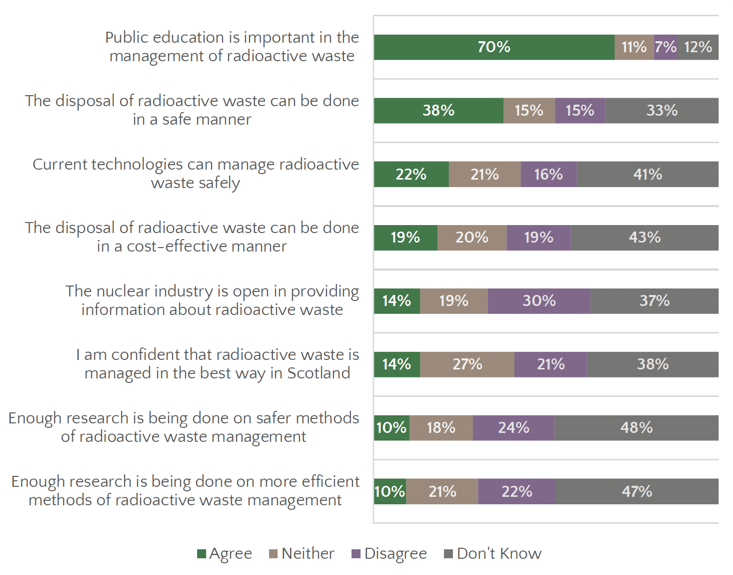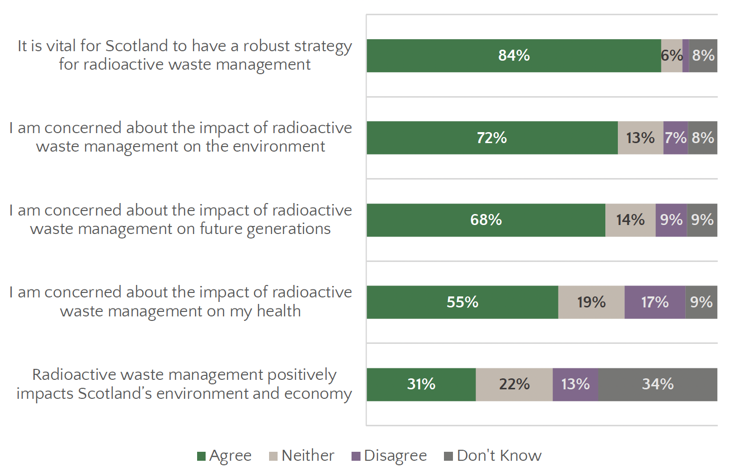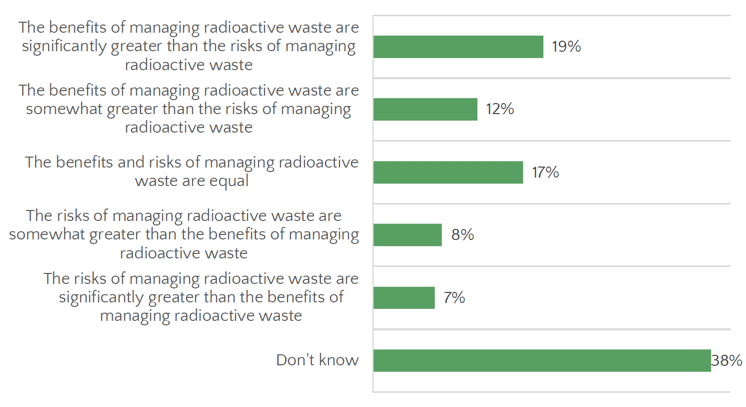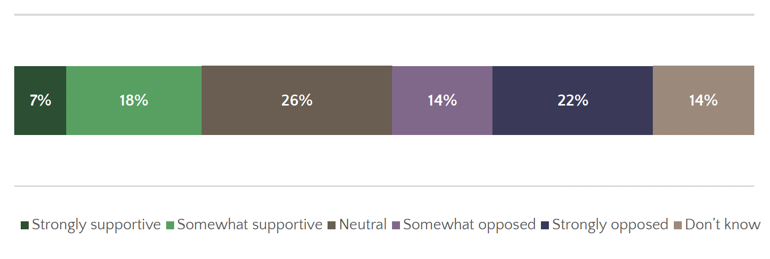Radioactive Waste Management - Public Attitudes Survey for Scotland
This report summarises findings from a representative survey of the Scottish public that provides new insights into the perceptions and views towards radioactive waste management in Scotland.
Chapter 3: Attitudes toward radioactive waste management
This section explores the public's attitudes towards specific aspects of radioactive waste management, including their concerns about radioactive waste and their support for the construction of new facilities.
3.1 Attitudes towards radioactive waste management
Respondents were asked a series of questions about their attitudes towards and opinions on radioactive waste management in Scotland.
Across all statements, the largest agreement amongst those with an opinion was registered in relation to the statement 'Public education is important in the management of radioactive waste'. Here, a large majority (70%) of respondents expressed an opinion agreeing that public education is important in the management of radioactive waste. In contrast, only 11% neither agreed nor disagreed and 7% disagreed (Figure 3.1).

Base: All (2,160)
The second greatest agreement amongst respondents was that disposal of radioactive waste can be done in a safe manner (38%).
Uncertainty was significantly higher for the other statements surveyed, as signified by the large proportion of respondents that reported that they 'don't know' to what extent they agree or disagree with each statement. Levels of 'don't know' responses varied by statement but were reported by over a third of the respondents. At its highest, nearly half stated that they 'don't know' that enough research is being done on safer (48%) and more efficient (47%) methods of radioactive waste management, suggesting that knowledge of research on radioactive waste management is particularly low amongst the population.
3.2 Concerns of radioactive waste management
A large proportion of respondents agreed that they were concerned with the impacts of radioactive waste management (Figure 3.2). The highest level of concern was registered around environmental impacts, as almost three in four respondents (72%) agreed that they are concerned about the impact of radioactive waste management on the environment. However, a majority were also concerned about the impact on future generations (68%) and on their health (55%).
A large majority (84%) agreed that it is vital for Scotland to have a robust strategy for radioactive waste management.
Some also believed that radioactive waste management can have positive effects, with just under one in three (31%) agreeing that radioactive waste management positively impacts Scotland's environment and economy. A nearly equal proportion (34%) reported that they 'don't know' if radioactive waste management positively impacts Scotland's environment and economy.

Base: All (2,151)
Similarly, when considering the risks and benefits of radioactive waste management, 38% reported that they didn't know if the benefits or the risks are greater (Figure 3.3). Beyond those who didn't know, a sizable percentage believed that the benefits of managing radioactive waste are greater than its risks (31%), while only a small minority believed that the risks are greater than the benefits (15%).
Respondents were then given the opportunity to explain the reasoning behind their answers. 1,195 respondents gave comments at this opportunity.
A large proportion of respondents felt that they did not know enough about radioactive waste to make an informed comment on the risks or benefits of managing it. Many were of the view that there is a lack of information on the risks and benefits of managing radioactive waste at a local level, whether through Scottish Government channels or traditional media. Some respondents caveated that they have had no need to search for information regarding the disposal of radioactive waste, while others wrote that radioactive waste management is typically not highlighted to the public unless there is an incident:
"There is no open/ promoted information advertised by Scottish Gov[ernment]. It is not a topic often mentioned in traditional media".
Many believed that more transparent information needs to be shared with the public to enable them to feel confident in forming opinions on the matter, and address any misconceptions or concerns about the topic:
"The term radioactive is scary. People either don't know because they don't care or are too worried to even look into what is happening with it. Public education is vital clearly".
Meanwhile, some respondents who described themselves as 'laypeople', said that they felt it was the responsibility of decision makers – rather than the public – to weigh up any risks and benefits, and provide appropriate, publicly available updates or bulletins on their decisions and reasoning:
"As a layman, you'd hope and trust [that] those making these decisions now are actually working on it - nothing wrong with a quick quarterly news update".
Likewise, others felt that decisions relating to radioactive waste management should be left to, and informed by, "scientists who are experts in that field".
Other respondents highlighted the benefits of managing radioactive waste. For many, there was an overall sentiment that it is "better to be proactive rather than reactive" and that "the risk of managing radioactive waste are far outweighed by the risks of not managing" it.
Respondents suggested a myriad of positive outcomes from the proper management of radioactive waste, including the protection of human health, a "cleaner and safer environment" for current and future generations (with some respondents referencing their children and grandchildren), and a reduction in carbon emissions:
"Making radioactive products safely and storing and disposing of their waste effectively creates a more efficient and carbon neutral future".
Some respondents mentioned the financial or employment benefits of effective radioactive waste management, in improving conditions for those working in the sector and those living or working near radioactive waste sites. Others cited the risks associated with not managing radioactive waste, such as exposure or leakage, and felt that rigorous standards should be in place, with strong independent oversight.
Aside from sites, plants and other facilities directly involved with radioactive waste, respondents noted the everyday uses of radioactive products, such as in power generation and medical devices like X-rays, to further point towards the benefits of safe management and disposal:
"If radioactive waste is what I assume it to be; the byproduct of nuclear energy, cancer treatment etc, then the costs of its safe disposal are far outweighed by cheaper energy and saving lives".

Base: All (2,154)
3.3 Support for new facilities
The respondents were divided on support for facilities to manage radioactive waste in their local area (Figure 3.4). While one in four (25%) reported that they were supportive, a similar proportion reported that they were neutral to the idea (26%) and a plurality (36%) reported that they were opposed to the idea. Opposition to the construction of facilities for radioactive waste management in their local area was particularly apparent, with 22% of those surveyed saying that they were strongly opposed. In contrast, those who were supportive of the notion were more likely to be only somewhat supportive, as reported by 18% of those surveyed.

Base: All (2,145)
Contact
There is a problem
Thanks for your feedback